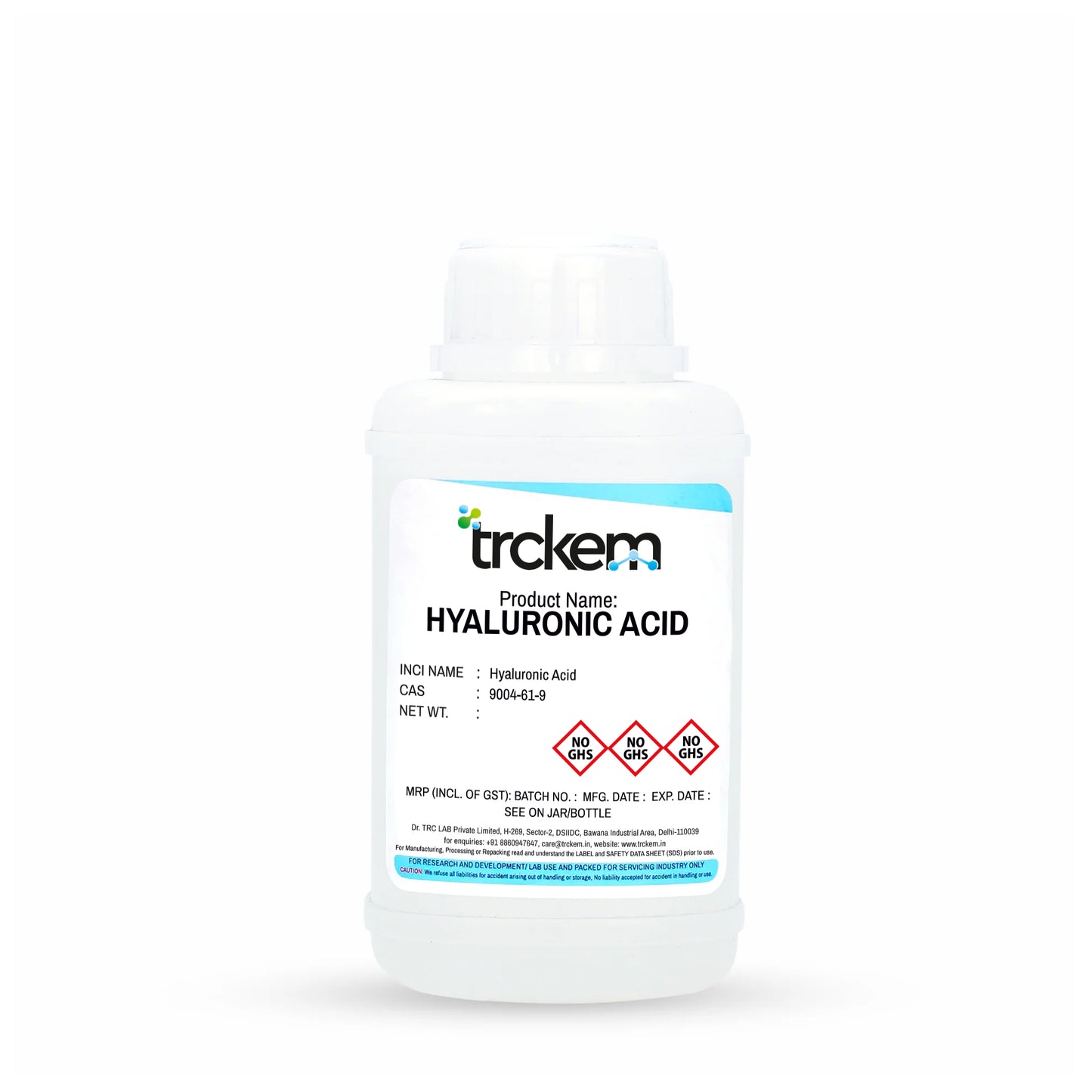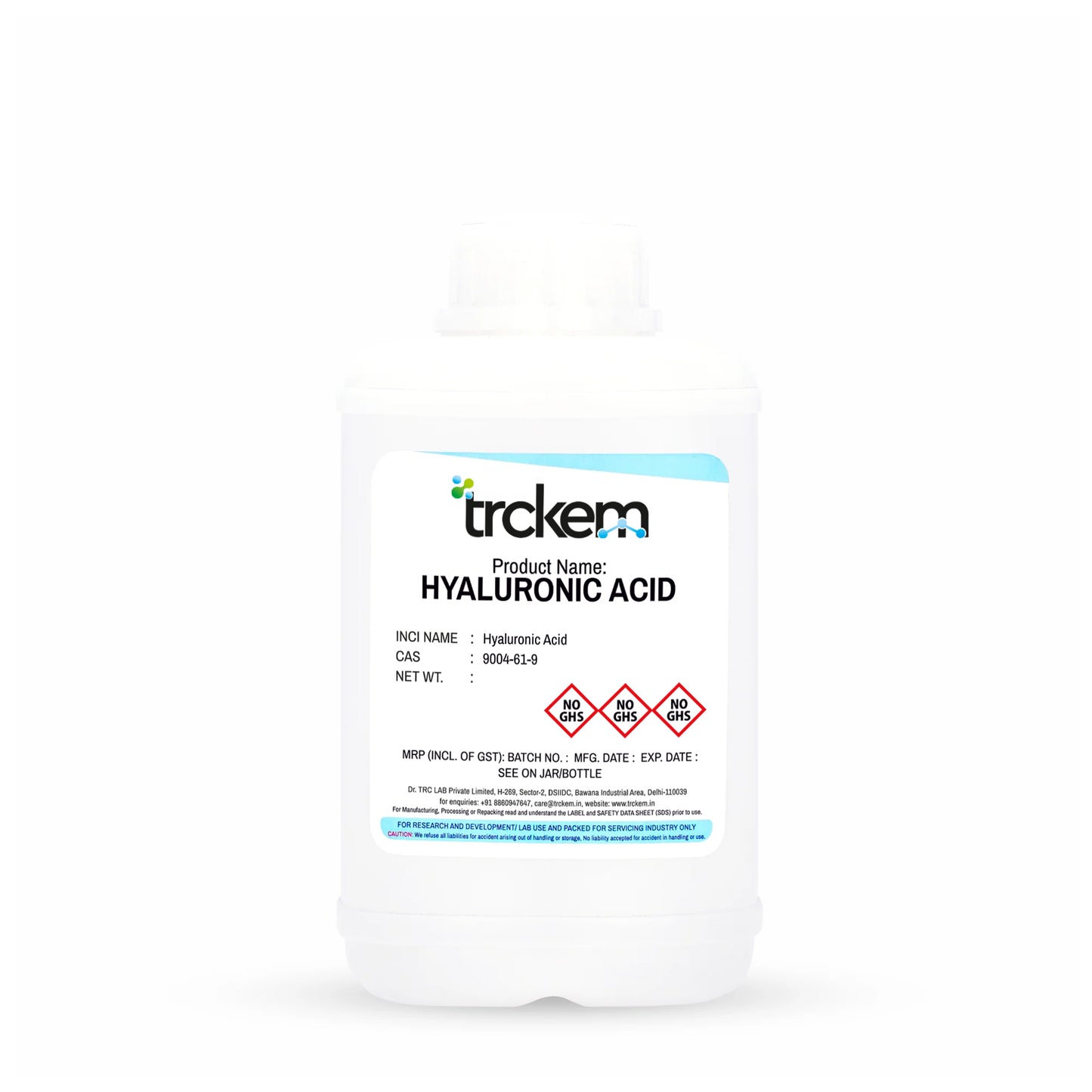

THE STORY OF HYALURONIC ACID

Hyaluronic Acid: The Ultimate Hydration Molecule for Plump, Healthy Skin
Hyaluronic Acid (HA) is a powerful natural humectant capable of holding up to 1000x its weight in water.
It provides deep hydration, skin plumping, smoothing, and anti-aging benefits.
Found in serums, creams, gels, masks, and haircare, it is one of the most trusted skincare ingredients globally.

Biotechnology-Derived Polysaccharide Engineered for Superior Moisture Retention
Modern Hyaluronic Acid is produced via microbial fermentation using:
• Streptococcus or Bacillus-based biofermentation
• Plant-based enzymatic technology
It is then purified and standardized into:
• High Molecular Weight (HMW) – surface hydration & film-forming
• Low Molecular Weight (LMW) – deeper penetration
• Oligo HA – maximum absorption & repair
TRCkem provides all molecular weight grades based on formulation needs.

Hydrate. Plump. Restore.
Hyaluronic Acid delivers exceptional skincare benefits:
✅ Deep moisture retention for long-lasting hydration
✅ Improves skin plumpness & elasticity
✅ Smoothens fine lines & early wrinkles
✅ Strengthens skin barrier
✅ Soothes irritation & boosts repair
Used in: serums, moisturizers, eye creams, hair conditioners, scalp tonics, sheet masks, gels, cleansers & medical cosmetics.

Safe, Versatile & Effective in All Skin Types and Formulations
• Typical use level:
– 0.01–0.5% depending on molecular weight
• Pre-dissolve in water or glycerin for easy dispersion
• Compatible with AHA, Vitamin C, Niacinamide, peptides & botanicals
• Works across pH 3–9
• Non-irritating, hypoallergenic & safe for all skin types
• Store airtight—protect from humidity to prevent clumping
• Ideal for both leave-on and rinse-off formulations
Formulator’s Queries, We Answered
1. What is Hyaluronic Acid?
Hyaluronic Acid (HA) is a naturally occurring polysaccharide found in the skin, connective tissues, and joints. It is widely used in personal care products due to its exceptional water-retention capacity, helping to hydrate, plump, and smooth the skin.
2. What is the CAS number and INCI name of Hyaluronic Acid?
CAS Number: 9004-61-9
INCI Name: Sodium Hyaluronate / Hyaluronic Acid
3. What are the benefits of Hyaluronic Acid in personal care products?
Hyaluronic Acid offers numerous skin benefits, including:
Deep hydration: Retains up to 1,000 times its weight in water.
Plumping effect: Reduces the appearance of fine lines and wrinkles.
Skin barrier protection: Enhances moisture retention and resilience.
Soothing & anti-inflammatory: Helps calm irritation and redness.
Non-comedogenic: Suitable for all skin types, including oily and acne-prone skin.
4. How does Hyaluronic Acid work in cosmetic formulations?
Hyaluronic Acid functions as a powerful humectant, attracting and holding moisture in the skin. It enhances hydration, elasticity, and firmness, making it a key ingredient in anti-aging and moisturizing products.
5. Is Hyaluronic Acid safe for all skin types?
Yes, Hyaluronic Acid is gentle, non-irritating, and safe for all skin types, including sensitive and acne-prone skin.
6. What types of personal care products contain Hyaluronic Acid?
Hyaluronic Acid is commonly used in:
Moisturizers & face creams
Serums & essences
Sheet masks & hydrating gels
Sunscreens & anti-aging formulations
Lip balms & eye creams
7. Can Hyaluronic Acid be combined with other ingredients?
Yes, Hyaluronic Acid pairs well with:
Vitamin C to boost brightening effects.
Peptides & ceramides to enhance skin barrier function.
Niacinamide for improved skin tone and texture.
Glycerin & Panthenol for enhanced hydration.
8. Does Hyaluronic Acid cause any side effects?
Hyaluronic Acid is generally well-tolerated. However, in rare cases, using it in very dry conditions without a moisturizer may lead to temporary dehydration as it can pull moisture from deeper skin layers.
9. What is the recommended concentration of Hyaluronic Acid in personal care formulations?
0.1% to 2% in serums and creams.
Up to 5% in professional skincare treatments.
Low molecular weight HA penetrates deeper for anti-aging benefits.
High molecular weight HA stays on the surface for hydration and barrier protection.
10. Is Hyaluronic Acid natural or synthetic?
Hyaluronic Acid can be naturally derived from bacterial fermentation or synthetically produced for high purity and stability. Most cosmetic-grade HA is vegan-friendly and sourced through fermentation.
11. Where can I purchase high-quality Hyaluronic Acid for formulation purposes?
Hyaluronic Acid is available from cosmetic raw material suppliers. Look for pharmaceutical-grade or cosmetic-grade HA to ensure optimal efficacy and safety in formulations.




